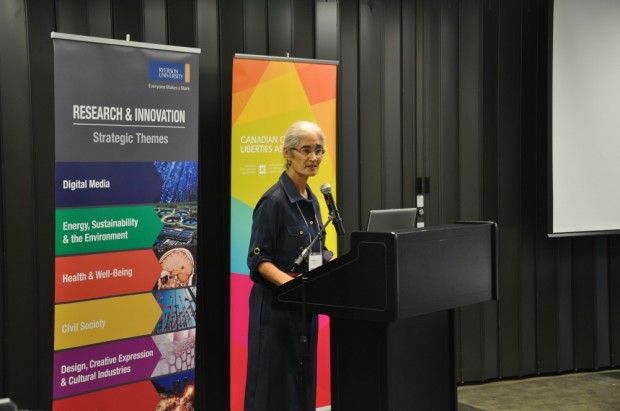
Danielle McLaughlin, director of education and administration at the Canadian Civil Liberties Association. Photo courtesy the CCLA.
By: Paul Rocca
The Canadian Civil Liberties Association is celebrating its 50th anniversary as an organization with a long history of political involvement and activism for the interest of protecting Canadian civil rights.
“I’m very proud of the organization as a whole,” said Danielle McLaughlin, the CCLA’s director of education and administration. “It’s unique to Canada. There’s no other organization that’s done the kind of work that this one has done.”
McLaughlin, who has worked for the organization for 26 years, is currently the CCLA’s longest-serving member.
“When people study the organization, as I hope they will be doing for many years to come, they will understand that we’ve been involved with most of the major charter cases since 1982,” she said. “We’ve been involved in the deep consideration of what rights and freedoms are all about in Canada, and I’m very proud of that.”

Noa Mendelsohn Aviv, director of the CCLA’s equality program, in a 2012 protest of the ‘Protecting Canada’s Immigration System’ act. Photo courtesy the CCLA.
The CCLA has, in fact, been involved in issues in Canada ranging everywhere from freedom of expression to the issue of online privacy, and even matters of national security. The organization is also known for occasionally taking stances unpopular among the public.
In October of 1970 in what is known as the October Crisis, the extreme separatist group known as le Front de Libération du Québec kidnapped two government workers: British Trade Commissioner James Cross and Quebec Labour Minister Pierre Laporte, who was later found murdered. In response, the federal government invoked the War Measures Act, effectively instituting martial law and suspending habeas corpus. Though the use of the measure was mostly supported by the public, the CCLA and its general counsel Alan Borovoy denounced the action as excessive and unnecessary; a position eventually shared by René Lévesque and Tommy Douglas.
“We often joke that, when we’ve made everyone angry, we know we’ve done something right,” said McLaughlin.
Borovoy later worked with the Ministry of National Defense to develop a new measure to replace the War Measures Act.
“They’re unpopular topics,” said Noa Mendelsohn Aviv, director of the CCLA’s equality program. “To the uninitiated, it sounds like we’re supporting terrorists. Of course we’re not. We’re just saying that if you’re going to be using measures, you have to use them carefully. Blanket measures are going to capture far more people than is necessary. We need, as much as possible, to protect the rights of individuals.”

1970 – The War Measures Act is employed following the FLQ’s capture of two government officers. Despite the act’s support among the public, the CCLA denounced its use as excessive and unnecessary. CCLA general counsel Alan Borovoy later worked with the ministry of national defense to replace the act with a new measure. Photo courtesy Wikimedia Commons.
Throughout her time at the CCLA, Aviv says she has seen discrimination alive and well in Canada, best demonstrated by the recent distribution of racist pamphlets in Brampton, Ontario. The leaflets singled out Canada’s Sikh community above the words “Is this really what you want?”
“We are seeing terrible statements coming out of all sorts of sectors around immigrants, newcomers, racialized communities,” said Aviv. “There is certainly homophobia, and there is certainly racism. Some of it is thinly-veiled. A lot of the anti-refugee, anti-immigrant, and anti-religious oppression – which is just a lot of anti-Muslim rhetoric – is really just thinly-veiled xenophobia and racism.”
As for the future, McLaughlin says the issues the CCLA concerns itself with will continue to evolve.
“The nature of what you fight for does change over time,” she said. “Issues of freedom of expression are still very important, but a lot of it is now internet-based issues.”
The Canadian Civil Liberties Association will be celebrating its 50th anniversary with a concert on Saturday, May 3, 8pm at Trinity St. Paul’s United Church in Toronto. For tickets and more information, visit their website here.

